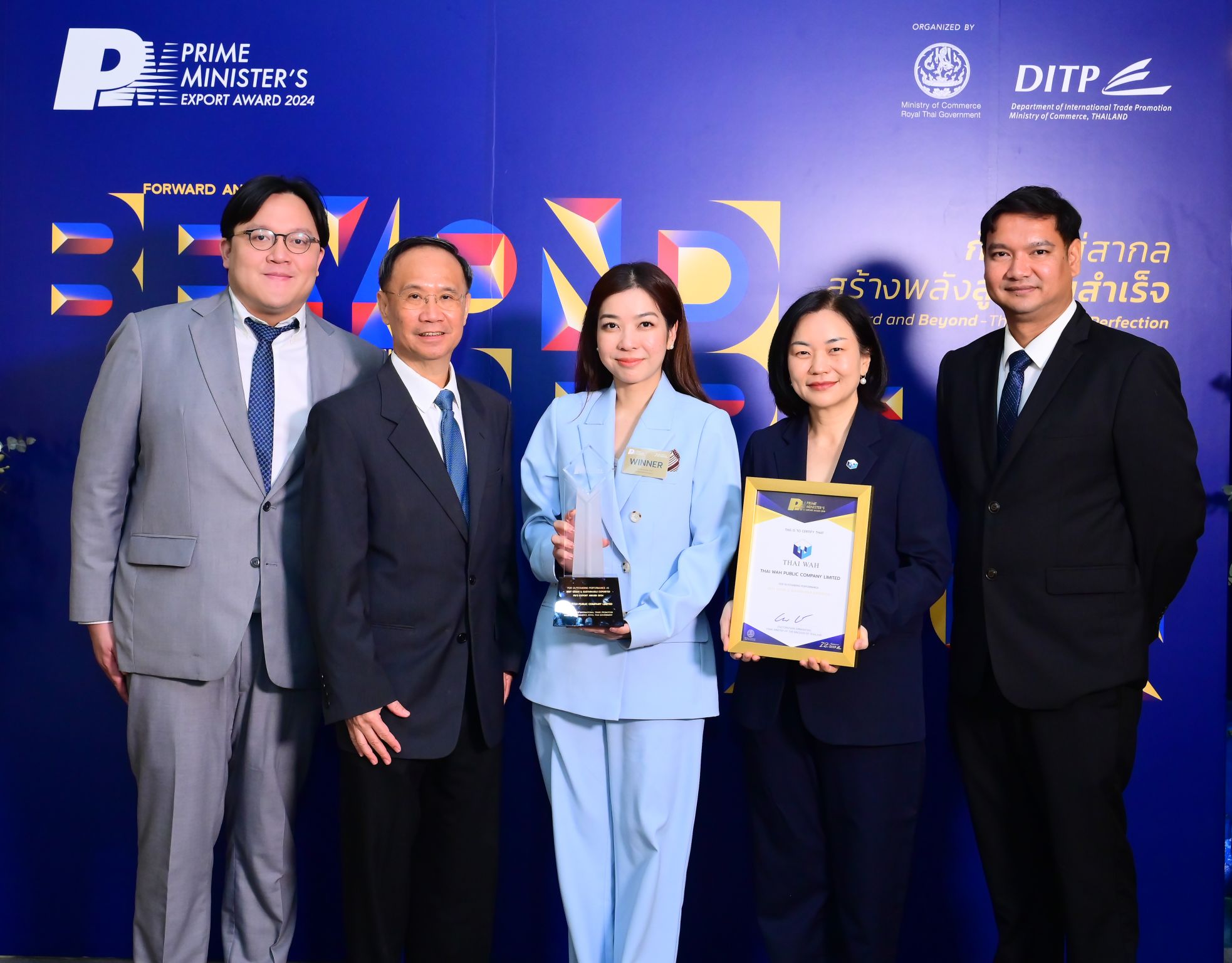Earlier this week we revisited one of two Cleantech Discussion board Asia 2024 periods on agri-food innovation, in anticipation of the occasion’s return to Singapore subsequent week.
The second of these periods was a hearth chat with Hataikan Kamolsirisakul, Head of Technique, Sustainability and Innovation, and New Enterprise at Thai Wah Group.
Headquartered in Bangkok, Thailand, Thai Wah is without doubt one of the world’s largest producers of edible starches and noodles. It has factories throughout Southeast Asia and works instantly with over 50,000 farmers. Talking eventually 12 months’s Cleantech Discussion board Asia, Hataikan shared how the corporate is popping to expertise and enterprise mannequin innovation to sort out the area’s local weather challenges.

Thai Wah not too long ago received the Prime Minster of Thailand’s Export Award for Finest Inexperienced & Sustainable Exporter (Hataikan Kamolsirisakul, center)
30% Yield Decreases Because of Drought, Illness
Thai Wah sources over 1.3 million tons of crops yearly; primarily cassava, mung bean, and rice, which it processes into business starches and noodles. However with every passing 12 months, the local weather constraints being positioned on this provide chain have gotten more and more apparent.
“Within the final two years we’ve seen nearly a 30% yield lower for tapioca [cassava] farmers throughout Cambodia, Vietnam, and Thailand,” Hataikan mentioned. “The first issue was drought, and the second order of affect has been an increase in crop illnesses.”
Whereas Thai Wah has made substantial funding into crop breeding and genetics work to enhance resilience, it has additionally begun to discover different prospects.
“We’re shifting into what we name ‘soil innovation’; soil well being, soil biology,” she mentioned. This has included growth of organic inputs that may enhance crop diet whereas additionally offering resistance to environmental stressors, and with out the unfavourable impacts related to chemical inputs.
These biofertilizers and biostimulants might be produced utilizing sidestreams from Thai Wah’s core enterprise, corresponding to agricultural residues and waste: one other key space of focus for Hataikan and her staff. The corporate creates 500,000 tons of waste yearly, she defined.
“If we are able to upcycle that waste into bioplastics, cattle feed, or power, that’s an enormous alternative.”
Placing Farmers Entrance and Heart
The overwhelming majority of farmers that Thai Wah works with are smallholders, cultivating crops on simply a few hectares of land. These farmers function on extraordinarily skinny margins, and an opposed local weather, illness, or pest occasion may basically wipe out their household’s revenue for a whole season.
Convincing smallholders to take the danger of adjusting their ingrained approaches to farming by introducing novel inputs or different improvements is not any small activity.
Thai Wah collected suggestions instantly from its farmer companions and used the insights it gained to ‘de-risk’ its organic inputs for them. This concerned tailoring the merchandise to particular necessities, whereas offering native workshops to disseminate greatest practices for his or her use.
“We heard over 33,000 particular person ache factors from farmers,” Hataikan mentioned. “And most of it wasn’t about yield or crops. It was about household well being, training for his or her youngsters, monetary safety, security. These farmers have been doing the identical factor for 2 or three generations. They’ve been utilizing chemical fertilizer for 30, 40 years. You possibly can’t simply inform them to modify and wait 9 months for outcomes,” she added.
“Our biofertilizer product right this moment may help them save 5 — 10% on chemical fertilizer prices by changing about 50% of the chemical substances they use.”
Carbon Market Potential
Thai Wah can be exploring alternatives to unlock worth by means of carbon markets, although Hataikan voiced warning relating to obstacles to smallholder participation.
“We’re working with just a few consultants and with the Thai authorities to attempt to get to baselining and measure what we are able to decarbonize,” she mentioned. “However right this moment, in order for you a carbon undertaking finished with a smallholder, it’s nonetheless too complicated and costly.”
Over the longer-term Thai Wah is exploring using carbon credit and different local weather finance mechanisms as a part of its broader goal of lowering emissions whereas directing worth again to farmers.
“Our purpose is to construct platforms that may profit 1,000,000 farmers by 2030,” Hataikan mentioned.
Tapping Company Enterprise Capital
To succeed in that concentrate on, Thai Wah has acknowledged the necessity to have interaction with exterior innovators, whereas persevering with its personal inside R&D efforts.
“The purpose is to not innovate for the sake of innovating, however to seek out one thing that may scale throughout Southeast Asia, and perhaps the world,” Hataikan mentioned.
In late 2021 the corporate launched a company VC arm, Thai Wah Ventures, to spend money on tech start-ups engaged on agri-food and provide chain options.
Thai Wah Ventures focuses on 4 important themes:
- Agricultural and soil science deeptech
- Digital provide chain options
- Waste upcycling, with a deal with bioplastics manufacturing
- Novel practical meals components
Portfolio firms embrace:
- Agrizy (India): A digital platform connecting farmers with industrial patrons
- altM (India): Growing sustainable supplies from agricultural waste
- Nice Wrap (Australia): Producing compostable packaging movie from meals waste
Widespread to all these firms, and others that Thai Wah could spend money on or work with sooner or later, is a recognition that simplicity is required for real-world success in agri-food ecosystems.
“When you actually need to scale something with smallholder farmers, it must be easy, it must be sensible, and it has to make sense from day one,” Hataikan mentioned.
By pursuing each inside and exterior innovation methods and leveraging its relationships with farmers, Thai Wah is crafting a brand new mannequin for local weather resilience: one which places smallholders and their communities on the heart of Southeast Asia’s meals safety and sustainability.



